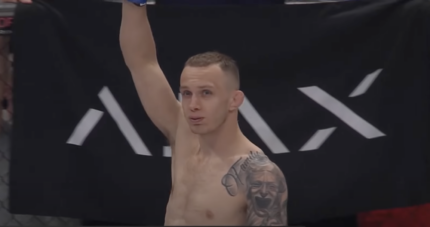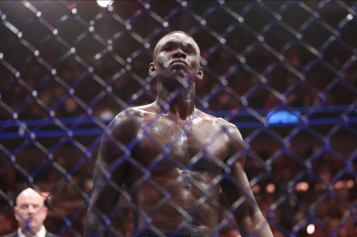When it was announced that both Anderson Silva and Nick Diaz tested positive for Nevada State Athletic Commission banned performance-enhancing drugs after their meeting at UFC 183 on January 31st, the MMA world stood still.
As the headlining bout on a huge pay-per-view card, the stakes were never higher for a returning legend Anderson Spider Silva, sidelined after a horrific leg injury during his UFC 168 title fight against current UFC Middleweight Champion Chris Weidman back on December 28th 2013. Rumors and questions abounded regarding how many fights Silva had left and if his leg could truly sustain a potential Nick Diaz mixed striking onslaught.
Those questions were answered quickly by the Spider but unfortunately, those werent the only questions that lingered.
Shortly after the fight, it was revealed that Silva failed an out-of-competition drug test due to drostanolone metabolites, which indicate the use of an anabolic steroid, as well as androsterone, a form of endogenous testosterone. To make matters worse, his opponent Nick Diaz failed a post-fight administered drug test due to marijuana metabolites, his third offense.
As a result, Silvas win has since been overturned into a no contest.
Now instead of fans celebrating his triumphant return, Silvas dominant and emotional victory has taken a darker turn for followers of the sport and has potentially ruined the image of MMA for those who were finally coming around to the fast paced combat action purely by its over-exposure on cable television.
Yet this isnt new. This has been occurring far too frequently and since the UFC is not the only promoter that has had this black eye affect the face of their business, MMA competition on the highest level is starting to look very tainted.
Fellow UFC competitors Hector Lombard and Ashley Evans-Smith also failed their drug test for their bouts at UFC 182 and 181, respectively. Ironically, Lombard appeared on the same UFC 182 card that featured UFC Light Heavyweight Champion Jon Jones, who was later exposed for failing an out-of-competition drug test for cocaine metabolites. Holder of the fastest KO in Bellator MMA history (0:06 seconds), Lombard bested Josh Burkman and also tested positive for desoxymethyltestosterone, a designer steroid.
Evans-Smith tested positive for a diuretic following UFC 181. A late replacement on the card, Evans-Smith suffered a submission loss to Raquel Pennington at the December 6th 2013 UFC event. These incidents, matched with the blockbuster revelation that UFC Light Heavyweight Champion Jon Jones tested positive for cocaine metabolites prior to his UFC 182 title defense against Daniel Cormier, has left MMA vastly exposed regarding regulation and promoter deference in these matters.
The MMA world received its first glimpse of how bad the playing field was skewed when former UFC Welterweight Champion, Georges St. Pierre, decided to vacate his belt, citing the usage of PEDs in the sport was unacceptable. To date St. Pierre has revealed that he turned down a potential Superfight against Anderson Silva until the sport as a whole can insure fair and balanced competition.
Bellators President, Scott Coker, addressed the issue last October after failed drug tests tainted Bellator 127 which took place at the Pechanga Casino in Southern California and aired live on Spike TV. Fighter Keith Berry, Fernando Gonzalez and Nick Moghaddam tested positive for elevated testosterone levels from marijuana, while former UFC veteran, Rob Emerson, failed due to designer performance enhancer, Modafinil.
I want to make it very clear that under new management, Bellator will simply not stand for performance enhancing drugs inside our cage, said Coker.
Although the State Athletic Commissions are in charge of handing out suspensions, the UFC has been raked over the coals by a sizeable portion of its fans for what seems to be disciplinary partiality towards champions and stars that have been caught. Jon Jones pre-fight test results before his clash with Daniel Cormier didnt stop the January 3rd 2015 event and Jones spent less than 72 hours in rehab before exiting to attend Super Bowl 49 where his brother plays on the winning New England Patriots defense. The UFC expressed their support for Jones via a statement:
We support UFC light heavyweight champion Jon Jones decision to enter a drug treatment facility to address his recent issue. While we are disappointed in the failed test, we applaud him for making this decision to enter a drug treatment facility. Jon is a strong, courageous fighter inside the Octagon, and we expect him to fight this issue with the same poise and diligence. We commend him on his decision, and look forward to him emerging from this program a better man as a result.
Meanwhile, fighters like Nick Diaz have been bounced from the promotion in the past for failing drug tests for marijuana usage. If the playing field is as bad as St. Pierre says it is, then MMA is about to have its next reckoning as Commissions and Promoters have to figure out how to not give the sport a popular culture black eye in the same way that bodybuilding has an unofficial viewpoint that PED usage is the hidden normalcy.
With the erratic and oftentimes contradictory statements from UFC President Dana White, the sport now has its dirty laundry exposed and only time will tell if it can clean itself up to lure back its greats while continuing to attract a new generation of fans.



